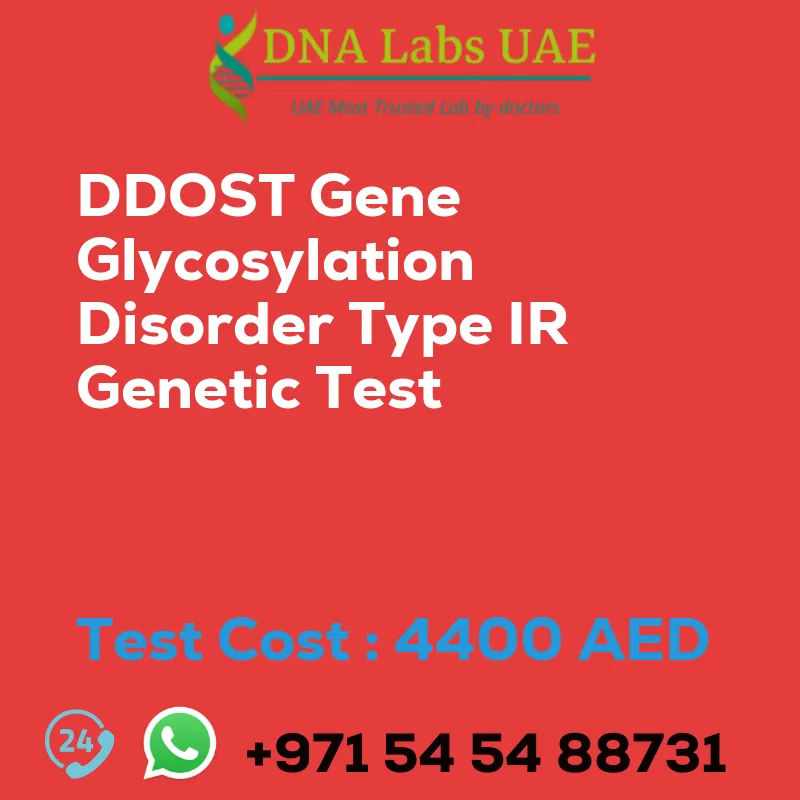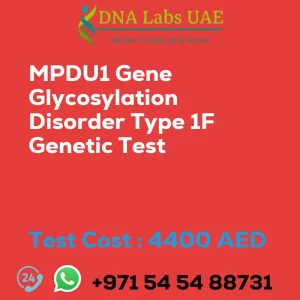DDOST Gene Glycosylation Disorder Type IR Genetic Test
At DNA Labs UAE, we offer the DDOST Gene Glycosylation Disorder Type IR Genetic Test. This test analyzes the DDOST gene for variants associated with Glycosylation Disorder Type IR using Next-Generation Sequencing (NGS) technology.
Test Components
- Price: 4400.0 AED
- Sample Condition: Blood or Extracted DNA or One drop Blood on FTA Card
- Report Delivery: 3 to 4 Weeks
- Method: NGS Technology
- Test Type: Metabolic Disorders
- Doctor: General Physician
- Test Department: Genetics
Pre Test Information
Prior to the DDOST Gene Glycosylation Disorder Type IR NGS Genetic DNA Test, it is recommended to provide the clinical history of the patient. Additionally, a genetic counseling session can be conducted to draw a pedigree chart of family members affected with Glycosylation Disorder Type IR.
Test Details
Glycosylation disorders are rare genetic disorders that impact the process of adding sugar molecules to proteins and lipids. The DDOST gene encodes a protein called dolichyl-diphosphooligosaccharide–protein glycosyltransferase subunit, which plays a crucial role in the glycosylation process. Variants in this gene can disrupt the normal function of the protein and lead to Glycosylation Disorder Type IR.
The DDOST Gene Glycosylation Disorder Type IR NGS Genetic Test utilizes NGS technology to simultaneously sequence multiple genes, including the DDOST gene. By doing so, it can identify genetic variants that may be responsible for the disorder.
To perform the test, a DNA sample is required, which can be obtained through a blood or saliva sample. The DNA is then sequenced using NGS technology to identify any variants in the DDOST gene. The results of the test can confirm a diagnosis of Glycosylation Disorder Type IR and provide information about the specific variant(s) present in the DDOST gene.
It’s important to note that this genetic test is specific to Glycosylation Disorder Type IR and the DDOST gene. Other types of glycosylation disorders may involve different genes, requiring additional genetic tests for investigation.
The information obtained from the DDOST Gene Glycosylation Disorder Type IR NGS Genetic Test can be valuable for genetic counseling, family planning, and potentially guiding treatment decisions.
| Test Name | DDOST Gene Glycosylation disorder type IR Genetic Test |
|---|---|
| Components | |
| Price | 4400.0 AED |
| Sample Condition | Blood or Extracted DNA or One drop Blood on FTA Card |
| Report Delivery | 3 to 4 Weeks |
| Method | NGS Technology |
| Test type | Metabolic Disorders |
| Doctor | General Physician |
| Test Department: | Genetics |
| Pre Test Information | Clinical History of Patient who is going for DDOST Gene Glycosylation disorder type IR NGS Genetic DNA Test A Genetic Counselling session to draw a pedigree chart of family members affected with Glycosylation disorder type IR |
| Test Details |
DDOST Gene Glycosylation disorder type IR NGS Genetic Test is a genetic test that uses Next-Generation Sequencing (NGS) technology to analyze the DDOST gene for variants associated with Glycosylation disorder type IR. Glycosylation disorders are a group of rare genetic disorders that affect the process of adding sugar molecules (glycosylation) to proteins and lipids. These disorders can result in a wide range of symptoms and can affect various organ systems in the body. The DDOST gene encodes a protein called dolichyl-diphosphooligosaccharide–protein glycosyltransferase subunit, which is involved in the glycosylation process. Variants in this gene can disrupt the normal function of the protein and lead to Glycosylation disorder type IR. NGS technology allows for the simultaneous sequencing of multiple genes, including the DDOST gene, in a high-throughput manner. This enables the identification of genetic variants that may be responsible for the disorder. The DDOST Gene Glycosylation disorder type IR NGS Genetic Test involves obtaining a DNA sample, typically through a blood or saliva sample, from the individual being tested. The DNA is then sequenced using NGS technology to identify any variants in the DDOST gene. The results of the test can help in confirming a diagnosis of Glycosylation disorder type IR and can also provide information about the specific variant(s) present in the DDOST gene. This information can be useful for genetic counseling, family planning, and potentially guiding treatment decisions. It’s important to note that this genetic test is specific to Glycosylation disorder type IR and the DDOST gene. There are other types of glycosylation disorders that may involve different genes, and additional genetic tests may be necessary to investigate those conditions. |








